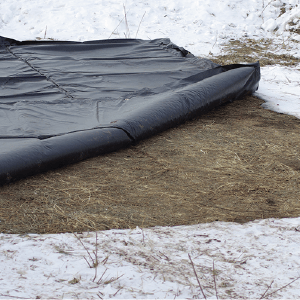GROUND THAWING BLANKETS: PREP FROZEN GROUND WITH POWERBLANKET
Cold weather causes problems for homeowners, business owners, and anyone working in the construction industry. It requires putting in extra prep work and time, which ends up costing more money. Prep can take longer than the actual job itself, so it’s important to know how to thaw frozen ground before getting to work.
UNDERSTANDING HOW THE GROUND FREEZES
From farming to construction, frozen ground comes with many challenges. Frozen ground occurs when the soil, rocks and water in the ground reach 32 degrees Fahrenheit. How deep it freezes, and how quickly, is dependent on more than just temperature. The NSIDC notes that frozen ground can be seasonally frozen ground or permafrost, sometimes occurring simultaneously. Because frozen ground can even occur without any water or ice, thawing it is not a simple process.
Weather
The ground temperature can be different than how cold the air is outside, which makes it difficult to tell how deep it is frozen. According to the National Snow and Ice Data Center (NSIDC), the layers of the ground can also vary in temperature. The afternoon heat from the sun makes the surface warmer. Other weather conditions make the deeper layers warmer than what’s on the surface.
Recent storms will also affect how quickly the ground freezes. Snow on the ground can act as an insulator, keeping the deeper layers from freezing. It takes less for ground to freeze if there is moisture in the soil than ground that is only affected by ambient temperature.
Type of Soil
How quickly the soil will absorb moisture and freeze depends on how much clay, silt or sand it is made of. Sandy soil results in more water retention, allowing it to freeze faster. Denser soil like clay may not freeze as easily, but it can take longer to thaw.
PROBLEMS WITH FROZEN GROUND
While the construction industry is one of the most impacted by frozen ground, any business that values the safety of their customers and employees will have this on their mind.
Safety
Slippery walkways can cause injuries. To protect both employees and customers, it’s crucial to remove snow and ice from construction areas and walkways. A business that isn’t weatherproofed runs the risk of lawsuits, injuries and lost time.
Projects
Any construction project can suffer when the weather turns cold. Frozen ground is especially problematic when it comes to roofing, pouring concrete, and digging. Changing seasons during one long project also has its challenges. Assessing the amount of prep work needed for these jobs every time the weather changes is a time-consuming effort.
GROUND THAWING METHODS
Because soil types are affected differently by freezing temperatures, it’s not always easy to tell what methods are most effective for thawing the ground. Some techniques are more costly and inefficient.
Heating Systems
Some industrial companies heat the ground with massive coils or large heating systems. The equipment required to thaw the ground is expensive and inefficient. This approach requires rental fees, transporting equipment, and a bit more money than the bid allows. Some heating systems makes it difficult to maintain a temperature needed to complete projects.
Ground Thawing Blankets
Thawing the ground can be cumbersome and expensive, but efficient ground thawing solutions can significantly help the process. Ground thawing blankets can be used repeatedly on any frozen job you have, which eliminates the need to spend money on additional rental equipment. They are easy to set up and use compared to other heating systems.
WHY POWERBLANKET GROUND THAWING BLANKETS?
Powerblanket has considered the difficulties and delays associated with freezing temperatures and has created a solution. Take the guesswork out of best methods and time required for prepping your worksite by using ground thawing blankets.
“I wish I had known about Powerblanket’s ground thawing blankets a couple years ago. We had a job in Mount Pleasant that got so cold that we couldn’t dig. We started laying out thermal blankets every night to avoid the hard freeze that happened overnight. We had to layer the thermal blankets in order to keep the ground warm enough to work each morning. Our progress was slow and labored, and we never knew what we would find at the job site each morning. It would have been so much easier if we had had Powerblankets.”
–A south-central Utah plumber
Work in any Climate
The high power density in Powerblanket’s ground thawing blankets help tackle the difficulty of thawing ground in harsh climates. This line of flat blankets has a higher power density and hotter temperatures than the concrete curing blankets, which is ideal for ground thawing applications.
The ground thawing blankets allow you to prep without thinking about temperature changes, snow, or the type of soil that is affected by freezing ground. They can thaw frozen ground at an average rate of 12”-18” each day, depending on the weather and soil.
Save Time and Money
With Powerblanket’s patented heating technology, you can prep the ground with little to no effort or supervision on your part. The ground thawing blankets can be set up quickly and moved when desired, allowing you to keep your jobs on track. While frozen ground has proven to be an expensive challenge for many businesses, using Powerblanket’s ground thawing blankets can allow you to focus your efforts on getting the job done quicker.
Time is money. Don't waste time waiting for the ground to thaw. Powerblanket has you covered.







